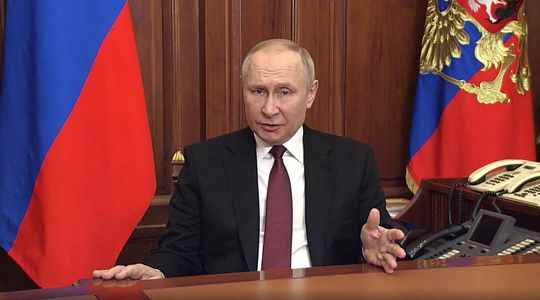Europe is waking up and the face of Vladimir Putin is appearing on television screens and the home pages of news sites. It is 5:30 a.m. and the Russian head of state, with grim eyes and clenched jaw, plunges the continent into torpor. The amazement can be summed up in a few words: “I have decided to launch a special military operation.”
In a message that Russian independent media first presented as previously recorded, the leader of the second military power put an end to several weeks of diplomatic negotiations which aimed to ease the escalation of tensions between Russia and its Ukrainian neighbor. “We will strive to demilitarize and denazify Ukraine,” he said. For the past few months, Russian diplomats have been threatening Ukraine with an offensive if its allies, from the European Union to the United States, do not firmly commit to renouncing the idea of integrating the country led by Volodymyr Zelensky in the politico-military organization of NATO.
The leader insolently chose his moment. A few minutes earlier, in a solemn address addressed directly to Vladimir Putin, the UN Secretary General, Antonio Guterres, called for restraint: “Tell your troops not to attack Ukraine. Give peace a chance. Too many people have already been killed.” The Head of State responded to him, indirectly, by publishing this message and skipping the UN discussions that had begun two hours earlier: the members of the United Nations Security Council had met urgently in response to the cyberattacks that multiplied since midnight at several sites of the Ukrainian government.
Sustainably weakened peace
The laconic five minutes of Russian speech ends and the first anti-bombing alarm sirens sound in several large cities, notably in Kiev, the capital, yet located nearly 800 kilometers from the Donbass front line. Explosion sounds follow. Kiev, Odessa, Kharkiv, Dnipro… Many cities, not only in the east of the country, are under bombardment. Airports, military airfields are targeted. Moscow is engaged in a war waged by air and land violating the territorial integrity of its neighbour.
Even before the night and the fog had dissipated, Russian soldiers set foot on Ukrainian territory, opening up the possibility of a ground attack. Tanks cross the border near Kharkiv in the northeast. A landing takes place in Odessa, in the south of the country. If Vladimir Putin assured that his plans did not include “the occupation of Ukrainian territories”, peace in Europe is permanently weakened by the massive and total attack of which he is the instigator.
From the UN headquarters in New York, Antonio Guterres watches, helpless, the war escalation and resumes speaking, visibly moved: “This is the saddest moment of my mandate as Secretary General of the United Nations”, he pours out. “President Putin, in the name of humanity, bring your troops back to Russia! This conflict must end now.” The regrets of the Western powers fit together. The US Secretary of State calls on the “world to stop Putin”. Targeted strikes, targeting border guards and military infrastructure, are raining down in the northeast. An ammunition depot would thus have been destroyed in Kharkiv.
The Russian army does not tremble
6 hours. In a register that breaks with the warrior rhetoric of Vladimir Putin, his Ukrainian counterpart, Volodymyr Zelensky, expresses himself on Instagram to the address of his compatriots. It indicates the introduction of martial law and assures: “Don’t panic, we will win”. A call for calm that seems heard in the heart of the capital, since Kiev is calm despite the deafening sirens.
The morning rises and the inhabitants who had probably gone to bed without imagining such a tomorrow are gradually becoming aware of the magnitude of the event. The speeches of Heads of State follow one another in the early morning. British Prime Minister Boris Johnson points to Vladimir Putin as “responsible” for the “bloodshed” to come. New sanctions are looming.
A threat that does not shake the arm of the Russian army, which continues to advance. Tank columns were filmed entering Ukrainian territory, including from Belarus and Crimea. Fighting continues on the eastern front line, notably in the separatist regions of Donetsk and Lugansk, whose independence Vladimir Putin recognized on Monday.
Many military installations, especially in Kharkiv, again, are under fire after Russian fire. Further inland, the bombardments intensified. Kiev airport was hit by a ballistic missile shortly before 7 a.m., while bombings were reported in Lviv, fifty kilometers from Poland. The Ukrainian army announces in the moments that follow that it has shot down five Russian planes and a helicopter in the east of the country. A little before 8 a.m., Emmanuel Macron speaks. He is the first head of state to use the word “war”. Yet it is indeed in such a slump that Europe locks itself up.
